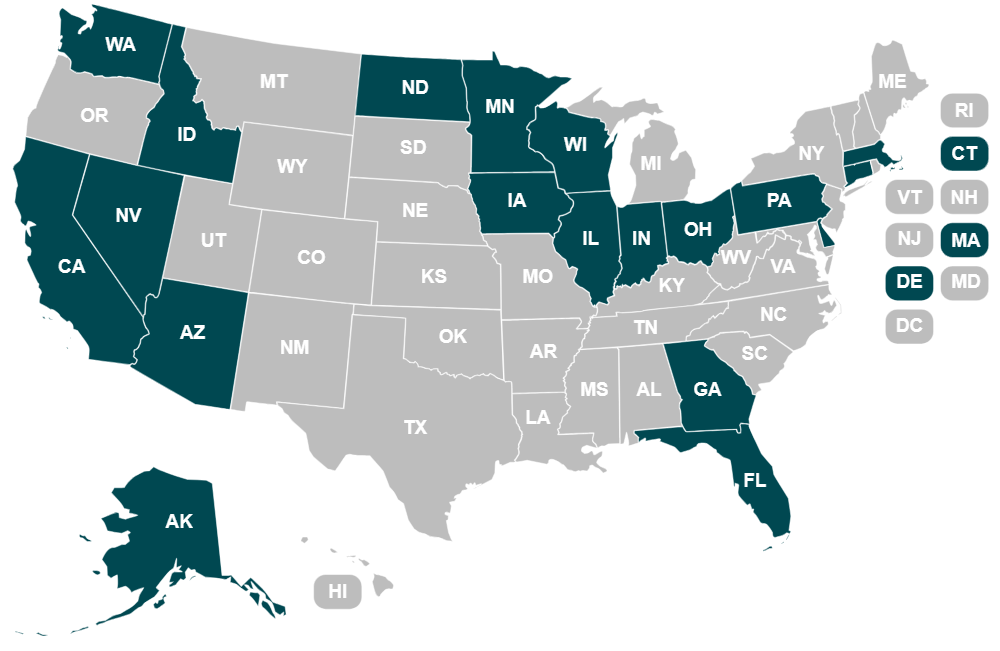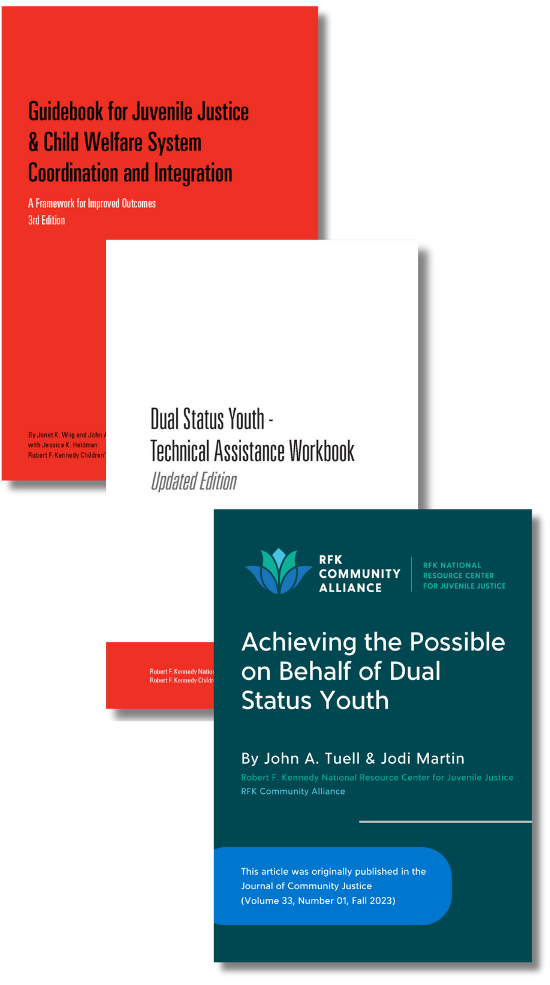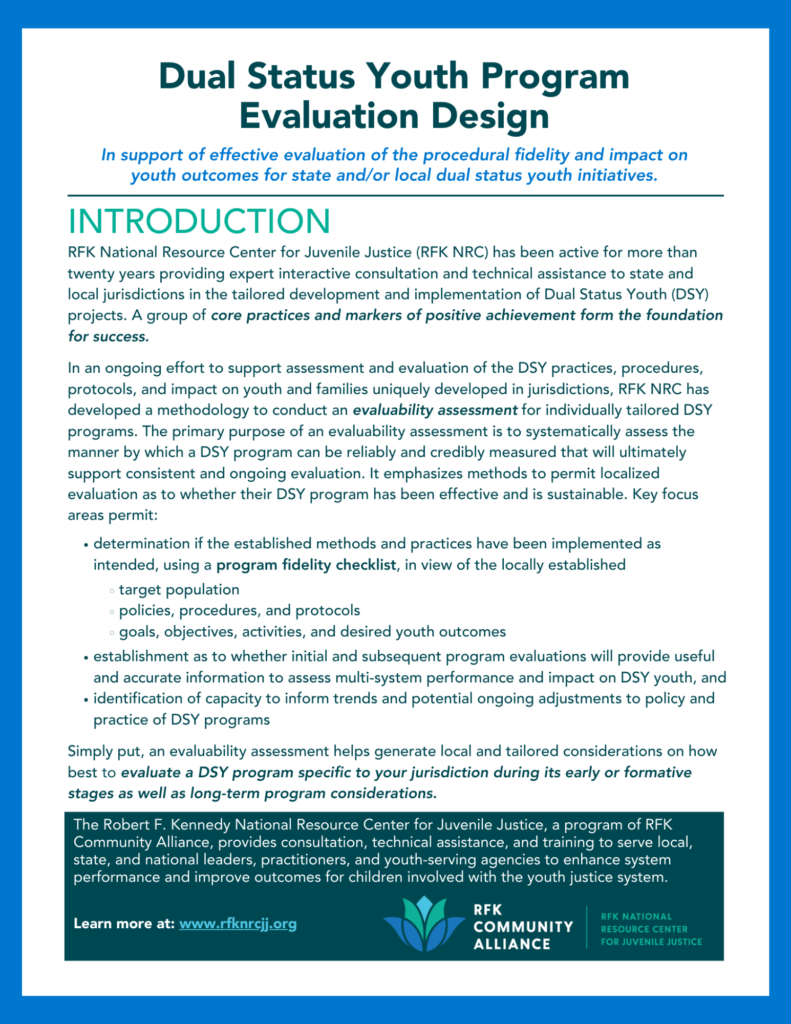The RFK National Resource Center works with local and state jurisdictions to achieve systemic reform on behalf of dual status youth – young people involved with both the child welfare and youth justice systems – and their families. Utilizing a tailored and collaborative approach, we guide youth-serving systems and multi-disciplinary partners in identifying, implementing, and sustaining policy and practice reforms that enhance system performance and make a positive impact on children, families, and communities. In partnership with the jurisdictions we serve, our work is conducted through a commitment to adolescent development science, best-practice methods and approaches, and evidence-based treatment and services.
Learn more about our work in this webinar session, Dual Status Youth Initiative: Achieving the Possible (recorded on April 23, 2024).
Benefits of Dual Status Youth Reform
Research confirms that dual status youth experience a higher likelihood of future delinquency, a rapid trajectory deeper into the youth justice and/or child welfare system, high rates of complex trauma, and troubling behavioral health and education outcomes. The RFK National Resource Center’s intensive, technical assistance framework supports achievement of multi-system alignment in policy, procedure, and protocols. The resulting cross-system collaboration produces measurable and sustainable practices and youth outcomes featuring:
- Routine early identification of dual status youth
- Diversion from formal processing at earliest opportunity
- Engagement of families/caregivers and connections to prosocial familial and community supports
- Regular multi-disciplinary team meetings that produce a collaborative crisis intervention plan
- Agreement on and measurement of dual status youth outcomes that include:
- reduction of recidivism
- placement/home stability
- behavioral health stabilization/improvement
- family/caregiver engagement and involvement, and
- educational engagement or achievement
What We Do & Who We Work With
Click here to learn more about our work focused on Addressing the Needs of Commercially and Sexually Exploited of Children (CSEC).
On-the-Ground Technical Assistance Initiatives
Our intensive Dual Status Youth Technical Assistance (DSY TA) Initiatives are tailored to each community and facilitated by experienced consulting staff to guide each jurisdiction through a collaborative exploration of data, practices, resources, and legal considerations ultimately aiming to design, implement, and sustain meaningful reforms. Our DSY TA initiatives are typically conducted during a 12-15 month period and integrate multiple on-site visits.
Who We Work With
While DSY TA initiatives are typically initiated and spearheaded by child welfare, youth justice, and/or court leadership, we encourage jurisdictions to involve a variety of stakeholders, including:
- Child Welfare Leadership/Management
- Youth Justice Leadership/Management
- Judges, Youth/Family Court Leadership
- Attorneys (e.g., District Attorneys, Public Defenders)
- Data Analysts (Child Welfare, Youth Justice)
- Education Representatives
- Behavioral Health Representative
- Youth/Family Representatives
- Community-Based Practitioners
- Policymakers
Communities We’ve Served
Our DSY TA framework has been successfully implemented in over 40 diverse jurisdictions, including state and local entities as well as Tribal communities. See the map and list below of jurisdictions that have undertaken a DSY TA Initiative. Click here to learn more about all of our partnerships and the communities we serve.
DSY Technical Assistance Sites

Alaska
Statewide
Arizona
Statewide
California
Statewide – California AB 1911
El Dorado County
Los Angeles County
San Diego County (CSEC focus)
Santa Clara County
Connecticut
Statewide
Delaware
Statewide (CSEC focus)
Florida
Palm Beach County
Georgia
Fulton County
Hall County
Newton County
Idaho
Bonneville County (CSEC focus)
Illinois
Cook County
DuPage County
Ogle County
Peoria County
Indiana
Marion County
Iowa
Polk County
Massachusetts
Essex County
Hampden County
Suffolk County
Minnesota
Beltrami County
Ramsey County
Stearns County
White Earth Indian Nation
Nevada
Clark County (CSEC focus)
North Dakota
Statewide
Ohio
Champaign County
Clark County
Hancock County
Knox County
Ottawa County
Summit County
Pennsylvania
Lancaster County
McKean County
Washington
Clark County
King County
Spokane County
Wisconsin
Jefferson County
Outagamie County
Dual Status Youth Reform Resources
The work is advanced by several publications (available in our Online Resource Library) that delve into research, best practice, and frameworks that can be applied by jurisdictions seeking to improve outcomes for dual status youth:

Guidebook for Juvenile Justice and Child Welfare System Coordination and Integration: A Framework for Improved Outcomes, 3rd Edition
Janet K. Wiig and John A. Tuell, with Jessica K. Heldman; Robert F. Kennedy Children’s Actions Corps, 2013
Dual Status Youth — Technical Assistance Workbook, Updated Edition
Robert F. Kennedy National Resource Center for Juvenile Justice, 2021
Achieving the Possible on Behalf of Dual Status Youth
John A. Tuell and Jodi Martin; Journal of Community Justice, Volume 33, Number 01, Fall 2023
Visit our Online Resource Library for additional publications and tools on Dual Status Youth Reform.
Dual Status Youth Program Evaluation Design
The Dual Status Youth Program Evaluation Design is a concise, 3-page guide for conducting an evaluability assessment of Dual Status Youth (DSY) programs. This resource offers jurisdictions a straightforward 4-step blueprint to evaluate the implementation and impact of their DSY practices, ensuring their programs are both effective and sustainable. Key focus areas include assessing program fidelity, evaluating outcomes, and providing long-term capacity for ongoing evaluation.
Additional DSY Program Evaluation Resources
- Core Practices Key to Success (PDF)
- Markers of Development, Progress, and Outcomes (PDF)
- Program Fidelity Checklist (PDF)
- Logic Model (PDF)
- Data Action Plan (PDF)
- Dually Involved Youth Policy and Procedures (Draft) – Clark County, NV (PDF)
- Standard Operating Procedures – Clark County, NV (PDF)
Jurisdictional Examples – Useful Tools & Resources
Click here to access examples of:
- Bench Cards
- Memorandums of Understanding (MOUs) for Data & Information Sharing and Cross-System Coordination
- Data Planning in the DSY Initiatives – WorkGrid
- Introduction to Process Mapping
- Multi-Disciplinary Team (MDT) Referral and Report Forms
- Management, Resource, and Training Exercises
- Dual Status Youth Initiative Site Manuals

